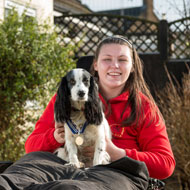
Molly has learnt to help and protect her disabled owner
A young cocker spaniel who learnt to perform essential, life-saving tasks for her disabled owner has received the PDSA’s Order of Merit - the animal equivalent of an OBE.
Three-year-old Molly was never intended to be an assistance dog, but now she is able to support her owner Lucy Watts MBE by performing daily tasks such as picking up and fetching items, removing clothing, untying shoelaces, opening doors and helping with the washing.
But Molly does more than just household tasks. She warns Lucy if her temperature spikes, which is an early sign of life-threatening septicaemia, by licking her hands and arms to give her time to seek help. She also alerts Lucy when her blood pressure is dropping so she can lie down in her wheelchair, preventing collapse.
Molly began her training at 10 months old, working with Dog Assistance in Disability (Dog AID), a charity that helps people with disabilities to train their dogs as assistance dogs.
Lucy, 23, suffers from Ehlers-Danlos syndrome which, together with other medical problems, can leave her feeling withdrawn, isolated and unhappy. Her condition is classed as life-limiting.
Before Molly became part of the household as an eight-week-old puppy, Lucy was bed-bound due to complications and struggling with chronic pain.
Her dog gave her something to focus on and a reason to get out of bed. When they are out in public together, Lucy feels more comfortable interacting with people, as she feels the dog allows people to see past her wheelchair.
This new-found confidence led Lucy to begin working with charities as an ambassador and trustee, giving public speeches and writing blogs. For this work she was awarded an MBE in the New Year’s Honours List 2016.
“Molly is the best companion I could ask for,” she said. “She seems to instinctively know if I’m in pain or not… I’m absolutely thrilled she has been awarded the PDSA Order of Merit. She was never intended as an assistance dog but her devotion to me and her training has never wavered. I would be lost without her.”
Her award was presented at home by PDSA director general Jan McLoughlin, who commented: “Molly has helped Lucy in so many remarkable ways; she makes a vast difference to her life on a daily basis. It’s an honour to award the PDSA Order of Merit to such a worthy recipient.”
Image © PDSA



 Zoetis has launched a new survey to identify management techniques for Equine Herpes Virus (EHV).
Zoetis has launched a new survey to identify management techniques for Equine Herpes Virus (EHV).